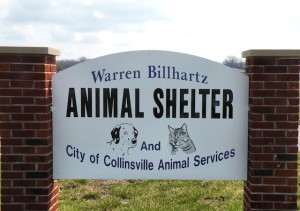It was the best of times, it was the worst of times for the Ward-Wiseman Animal Haven in Collinsville, Okla.
In a tale of two cities that share a name and a coal mining history, the animal shelter in the town of fewer than 6,000 near Tulsa, Okla., received a large donation in the spring of 2013 that should have gone to the Illinois town of about 25,000 near St. Louis. Before Susan Babbitt – founder of the Ward-Wiseman Animal Haven – spent any of the $188,981.03 endowment, the money was on its way to the Warren Billhartz Animal Shelter in Collinsville, Ill.
When Babbbitt received a call in early March 2013 from an Arizona law firm to inform her that the struggling Ward-Wiseman Animal Haven was the recipient of an endowment from the estate of Mary K. Thomas, she did not know the benefactor or how much money the shelter would receive. Babbitt completed the paperwork and waited for the check.
“I didn’t want to be gauche and ask how much it was for,” Babbitt said. “I nearly died when the check arrived.”
The call to let Babbitt know about the donation was to her mobile phone. The April 15, 2013 call to say the money went to the animal shelter in the wrong Collinsville was left on the Ward-Wiseman shelter’s voicemail.
A different person at the Arizona law firm had contacted the Collinsville, Ill., shelter, at the same time Babbitt was completing paperwork to receive the donation. When the money had not arrived in Illinois, the law firm was contacted and the money was soon gone from the Ward-Wiseman account.
Babbitt had planned to spend the money very conservatively, to buy only necessary items, so it would last as long as possible, she said. The Warren Billhartz Animal Shelter in Collinsville, Ill., is employing the same philosophy, Lt. Eric Zaber, of the Collinsville Police Department said. The police department has oversight of the shelter, which is also home to animal control for the City of Collinsville.
“The last thing we want to do is abuse a wonderful gift, that’s why we need to be conservative with the money,” Zaber said.
The entire amount of the donation will be spent on items directly benefiting the shelter, Zaber said. About $20,000 of the $188,981.03 has been spent to date.
Unlike the Ward-Wiseman shelter in Collinsville, Okla,, the Warren Billhartz shelter in Collinsville, Ill., receives funding from the city. However, the Billhartz shelter is like a younger sibling to the police department.
“The guys at the shelter usually get the hand-me-downs, and sometimes the hand-me-downs of the hand-me-downs,” Zaber said.
The donation has allowed Jesse Parrack and Nate Laleman, the shelter’s full-time staff, to get equipment that enhances their security, and that of the animals. The shelter has also been connected into the rest of City government’s telephone system and wireless internet, Zaber said.
“Those guys do a fantastic job, they deserve some things to make their jobs easier,” Zaber said.
Other enhancements at the facility include roofs added to the top of the dog kennels, which makes it harder for big dogs to escape, and a sally port for more secure transfers of animals into the shelter. Needed repairs were completed, the parking lot resealed and restriped and a combination scanner, copier and fax machine purchased, Zaber said.
Plans have also been made to buy an adjustable surgical table. Some of the veterinarians who work at the shelter need something to stand on so they can reach the table properly to perform surgeries.
Other future plans include more kennel repairs, painting the facility, digitizing the existing paper files and, eventually, a new animal control truck.
“We have an older truck that will need to be replaced in the future, but there is no need right now,” Zaber said.
Collinsville, Ill., Finance Director Tamara Ammann said many people ask why the City does not give some of the money to the Oklahoma shelter.
“It’s illegal for us to donate money,” Ammann said.
Meanwhile, all is not lost in Collinsville, Okla. When word of the donation mix-up reached Tulsa television news anchor Scott Thompson, a Collinsville, Ill., native, he helped it become a national news story. Soon donations started flowing into the Ward-Wiseman Animal Haven.
“We’ve received sympathy donations of about $87,000 in the past year,” Babbitt said. “It was a great mistake.”
One person sent $5, saying he wanted to help, but it was all he could afford, Babbitt said. A woman told Babbitt that the shelter was now in her will, although she had no plans to die soon.
The shelter that struggled to keep its doors open since it opened in 2004 now has $30,000 set aside in an investment account.
“I don’t know if there is ever going to be enough money to do what we have to do,” Babbitt said. “Shelters just spend money, they don’t make it.”
The Ward-Wiseman shelter has also used their donation money to make needed repairs. One major adjustment in their operations has been to get the animals spayed or neutered before they are adopted. In the past, the shelter did not have enough money to do it until they had received the adoption fee, which never covered the entire costs for the shelter.
Zaber and Babbitt share a philosophy of making donated money last as long as possible.
“That endowment is going to last longer than I’m going to be here,” Zaber said.




